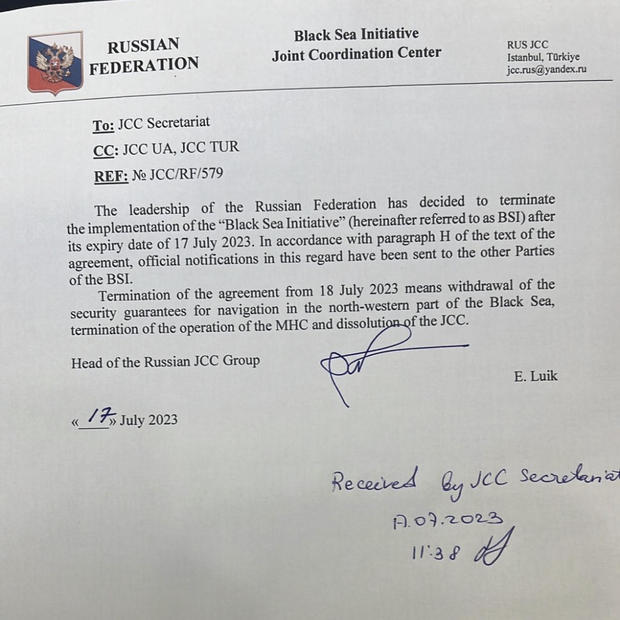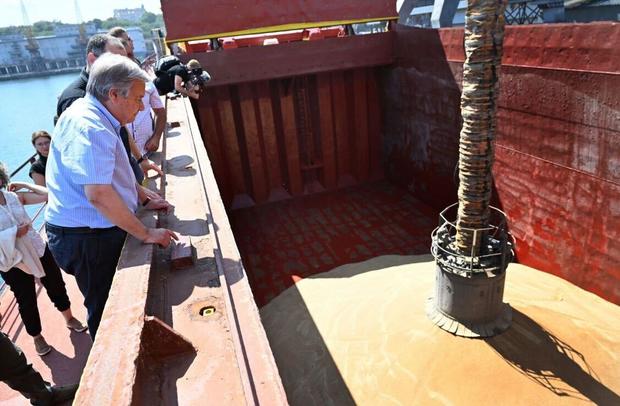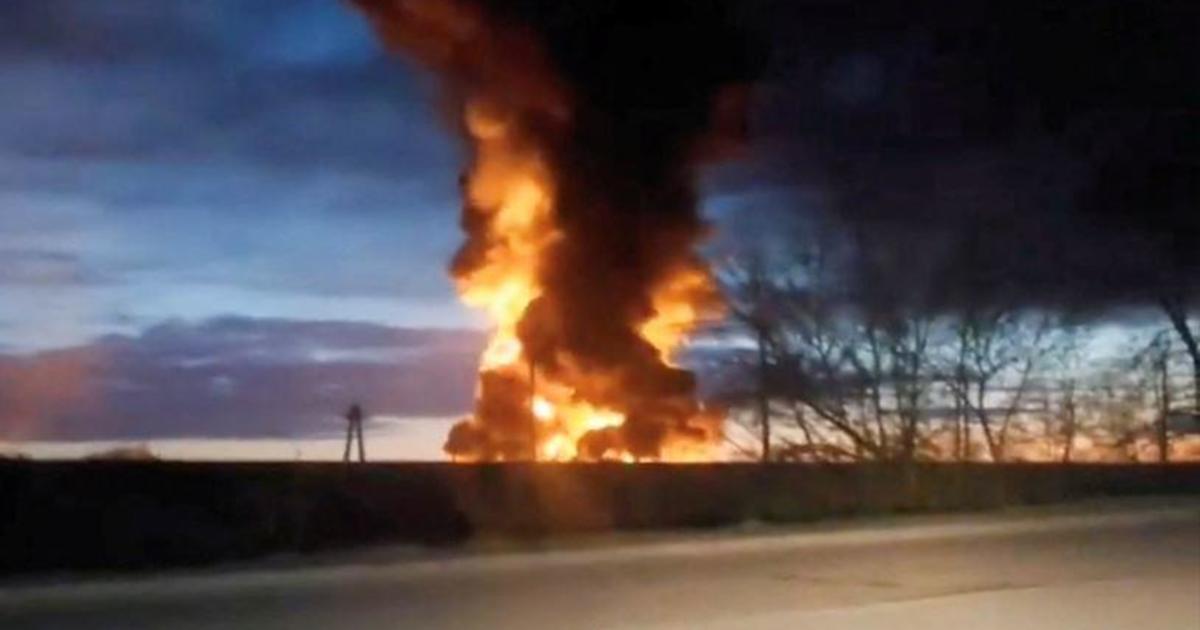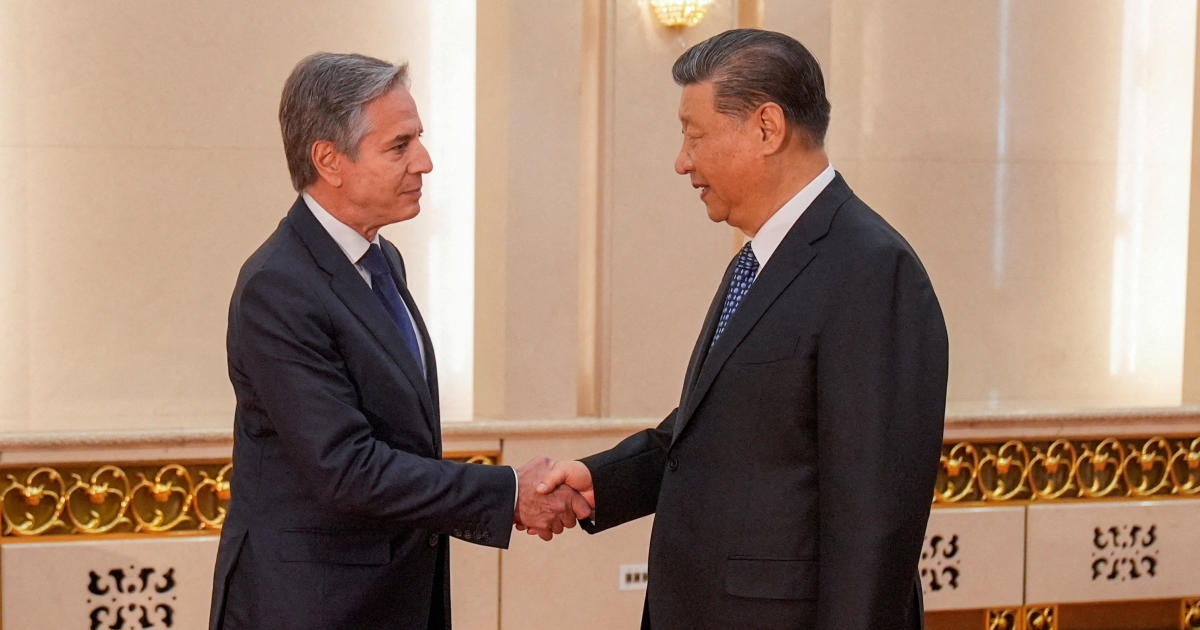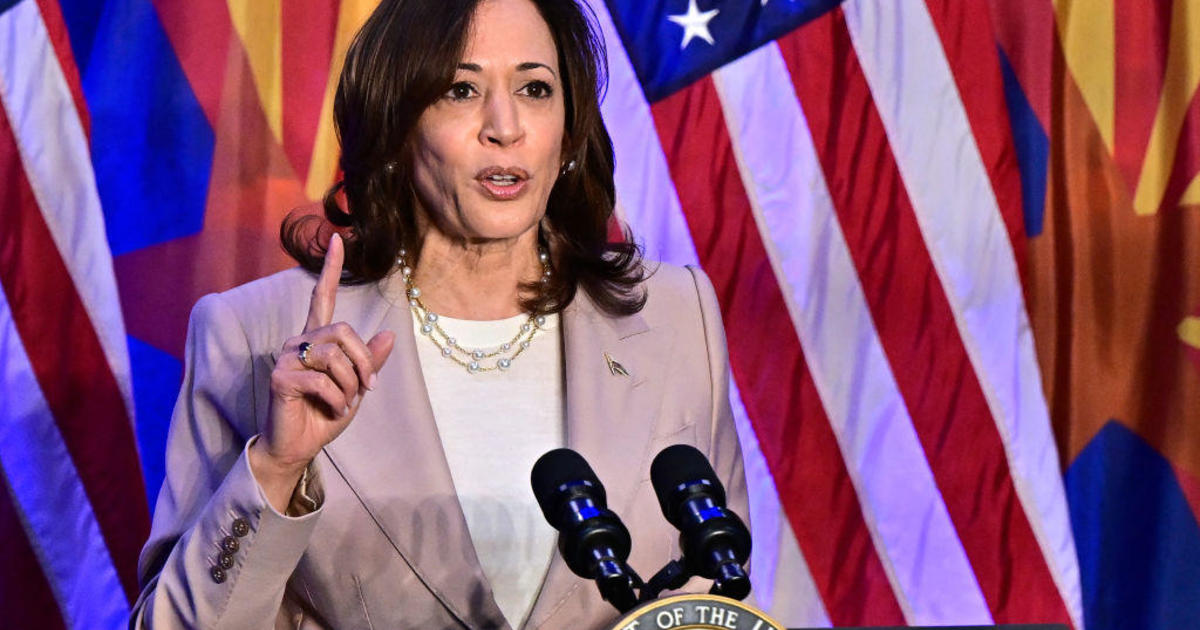Russia suspends Black Sea Grain Initiative with Ukraine, says it will return when deal is "implemented" fully
United Nations — Russia announced Monday that it would suspend its involvement in an agreement with Ukraine that has enabled both countries to continue exporting grain amid Russia's ongoing invasion of the neighboring nation. The breakdown of the Black Sea Grain Initiative, brokered by the United Nations and Turkey, threatened to drive global food prices back up and underscored the tension between the two sides as Ukraine pushes a grinding counteroffensive against Russia's nearly 17-month invasion.
"The Russians sent a letter this morning to the Joint Coordination Center in Istanbul announcing the termination of their participation in the Black Sea Initiative," a U.N. official told CBS News.
Kremlin spokesman Dmitry Peskov announced the move in Moscow on Monday, calling it a suspension rather than a termination. He repeated a complaint that Russia has made since the deal was first agreed last year, arguing that the U.S. and Ukraine's other international partners weren't allowing the pact to be carried out fairly by making it impossible for Russia to export some agricultural products.
"When the part of the Black Sea deal related to Russia is implemented, Russia will immediately return to the implementation of the deal," Peskov told reporters.
Adding to the confusion about what happens next, although the Kremlin said the agreement was suspended and not terminated, U.N. spokesman Stephane Dujarric said Monday that the official letter from Russia to the U.N. said it was terminated.
Russia's move came as Ukraine's Foreign Minister Dmytro Kuleba was in New York to speak at the U.N. He joined CBS "Mornings" on Monday and called on Russia to "stop playing hunger games."
"Last year, when the Black Sea Grain Initiative was introduced, grain prices in the world dropped by 20%, so the immediate outcome of the non-extension of the agreement will mean that prices for grain all across the globe will go up, and people in the most vulnerable regions of Asia, Africa, they will feel it," said Kuleba.
"Stop playing hunger games with the people around the world," he said, addressing Moscow. "It's impossible to fully compensate the blockade of Ukrainian ports by inland routes, so Russia is using hunger as an instrument to blackmail the world, pursuing it's own commercial interests."
Speaking to reporters at U.N. Headquarters on Monday, U.S. Ambassador Linda Thomas-Greenfield called it "another act of cruelty" by Russia, accusing Moscow of holding "humanity hostage."
Speaking last month to CBS' "Face the Nation" as negotiations dragged on over an extension of the grain agreement, the head of the World Food Programme, Cindy McCain, warned that "starvation and famine" were real risks for vulnerable populations globally if Russia didn't extend pact.
Richard Gowan, U.N. Director for the International Crisis Group, told CBS News on Monday that it was significant that Russia had "not quit the deal definitively."
Gowan acknowledged that it could merely "be a tactic to force the U.N. and Western powers to offer Moscow more concessions," however, and he noted that Russia appeared to be "growing increasingly contemptuous of the U.N. in general."
That may not bode well for a resurrection of the crucial grain export pact, which U.N. Secretary-General Antonio Guterres personally helped broker.
"I deeply regret the decision by the Russian Federation to terminate the implementation of the Black Sea Initiative – including the withdrawal of Russian security guarantees of navigation in the northwestern part of the Black Sea," Guterres said Monday, crediting the agreement with "the safe passage of over 32 million metric tons of food commodities from Ukrainian ports."
"At a time when the production and availability of food is being disrupted by conflict, climate change, energy prices and more, these agreements have helped to reduce food prices by over 23 percent since March last year," he said.
The U.N., the U.S. and several European nations and private banks have made great efforts to ensure that Russia can export its grains and fertilizers, as agreed under the terms of the grain deal, which has afforded Russia a bumper wheat export season and significant exports of fertilizers.
With many international banks weary of doing business with Moscow for fear of violating the myriad international sanctions against Russia, however, the Kremlin wants a regularized system of payment and has demanded that the country's own agricultural bank be admitted to the Belgium-based banking payment system known as SWIFT.
On Monday, the Office of the U.N. Coordinator for the grain initiative said that since it was signed in Turkey last year, more than 1,000 ships had sailed from the three ports designated for shipments from Ukraine under the deal.
The U.N. acknowledged Monday that several aspects of the agreement still needed tweaking, as "the 22 July agreement allows for the export of fertilizer, including ammonia, but none has been shipped under the Initiative."
The global body noted that since the end of April, "no vessel has been allowed to move to the port of Yuzhny/Pivdennyi," one of the three Ukrainian ports designated under the pact, indicating that Russia has also been lax on upholding the agreement.
The deal has allowed the safe export of more than 32.8 million tons of grain, other foodstuffs and fertilizers since it first began in July last year, greatly alleviating a global food price crisis.
The agreement never included a single document with signatures from both Russian and Ukrainian officials, but there were separate Memorandums of Understanding, including one between the U.N. and Russia that said the U.N. would assist in making sure Russian fertilizers were not blocked by secondary sanctions on ships, insurance or banking.
When it was first negotiated by Turkey and the U.N., the purpose of the pact was alleviate the drastic disruption in the global supply of grains, food and fertilizers that resulted from "Russia's invasion of Ukraine."
Both countries are among the top producers of grain globally, and the war launched by Vladimir Putin's government in February 2022, especially with the fighting around Ukraine's only sea coast, halted exports almost completely, sending food prices soaring.
The landmark deal enabled the export of wheat, sunflower oil and barley to resume, helping to lower food prices around the world.
While there has been concern over the impact of the grain deal's suspension, it may be mitigated in part by Russia having increased exports of wheat and corn recently.
Ukrainian President Volodymyr Zelenskyy and the U.N.'s Guterres had urged Russia to renew the agreement and several parties have said talks were still ongoing to find a new deal.
